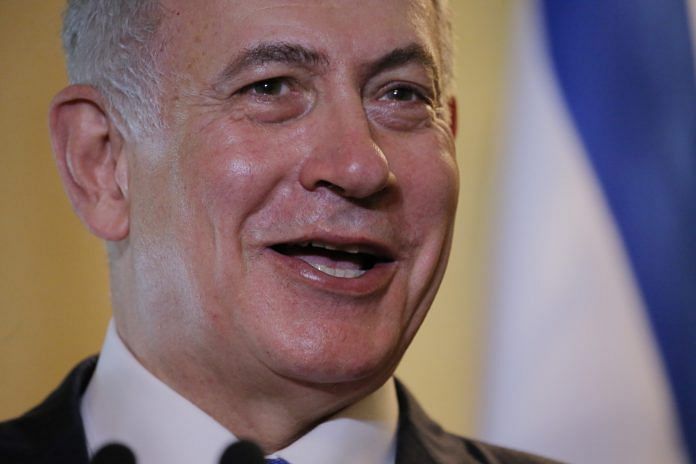‘Bibi’ Netanyahu is outspoken, informal and brilliantly articulate. Here’s what he said when India & Israel established full diplomatic relations in 1992.
Benjamin Netanyahu was a global star at a young age, and not just because his brother Elis led the storied Israeli commando raid at Entebbe airport to free its hostages, was the only one to die, and is a national hero. In his early 30s Benjamin was Israeli ambassador to the US, and wrote a best seller on terrorism: How The West Can Win.
There are two strong Israeli traits that greatly matter to us journalists. They are probably the most outspoken and informal society in the world. Netanyahu is both of these, and in good measure. He’s also brilliantly articulate in the English language, unlike some of the newer-gen Israeli public figures who prefer Hebrew. That he was such a star at a young age was also evident when he, as a deputy minister in the office of Prime Minister Yitzhak Shamir, was asked to speak with me on his behalf in January 1992, almost to the date that Prime Minister P.V. Narasimha Rao announced the upgradation of India’s relations with Israel to full diplomatic level, taking everybody—including us, the only Indian journalists in Israel—by surprise.
I, along with my photographer colleague Prashant Panjiar, was on a long reporting visit through the Middle East, visiting all the countries and spots from which we had reported the first Gulf War (after the occupation of Kuwait), exactly a year earlier, for India Today magazine. We were looking at the dramatic changes in the region within a year. Iraq, Kuwait, Jordan, Egypt and Israel were all on our itinerary.
Netanyahu was busy, we were told (no surprise), but would like to “shoe-horn” us into his schedule. And since we had rented a car, could we, possibly reach the Nahalat Yitzhak Cemetery in the small Tel Aviv suburban town of Givatayim, where Prime Minister Shamir was leading much of his cabinet on a memorial service for Avraham Stern, or Ya’ir, a prominent Zionist hero and martyr, member of Irgun and Lehi and founder of what came to be known as Stern Gang? He was killed by British policemen in 1942 in what we may usually call an “encounter” in India.
“Bibi” (Netanyahu’s popular nickname) was there too, we were told, and would try to meet us for 15-20 minutes.
But the ceremony went on just a little longer and Netanyahu was late for his next meeting. He greeted us, sort of apologetically, and said he was rushed, would have liked to speak with us, but what could he do now?
Perhaps moved by the disappointment he read on my face, he asked, do you want to ride in my car? We could talk on the way.
Usually, it would have been perfect. But I had a rented car too and leaving it behind, far from both Tel Aviv and Jerusalem, would have caused great trouble for us and messed up our further schedule that day, particularly when time was so tight on a multi-nation swing at what used to be a rather limited Reserve Bank of India foreign exchange per diem for Indian journalists travelling overseas.
I mumbled what the problem was. “Are you driving?” Bibi asked. I said yes. “Do you have a tape recorder?” he asked. I said yes. “No problem then, I will ride with you,” he said, “you drive and we will talk.”
That is how we recorded this short interview, his first as a minister to Indian media (he had been interviewed in 1985 when he was ambassador to the US by India Today’s Washington correspondent Inderjit Badhwar). You can read that interview here, in India Today’s excellently catalogued archives.
And please note the last question and answer, after we talk about the need for the two countries to make up for lost time and learn from each other. India and Israel had just upgraded their relations to full diplomatic level.
I suppose we can learn some more informality from you Israelis, I said in my concluding question in that interview.
And yes, we Israelis could learn from you how to make better tea, replied Netanyahu.
We stopped at a red light entering the busier part of the city just then. Netanyahu’s official car pulled up by our side. He apologised for the hurried chat, offered a firm hand, and he had changed cars just as the green came on.
It may feel unusual now, and I bet Israeli security is less relaxed now. But, in so many ways, it is not only an all-Israeli story but also an all-Bibi one.




It was Yonatan ‘Yoni’ Netanyahu who led the commando raid on the Entebbe airport, not Elis.
Unlike K P S Gill, Mr Netanyahu did not ask the columnist, International driving licence hai kya …